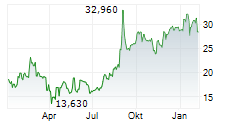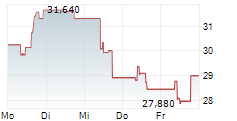
STOCKHOLM, Nov. 28, 2024 /PRNewswire/ - BioArctic AB's (publ) (NASDAQ STOCKHOLM: BIOA B) partner Eisai today announced today that Leqembi® (generic name: lecanemab) has been launched in South Korea. Leqembi received approval in South Korea in May 2024 for treatment in adult patients with mild cognitive impairment due to Alzheimer's disease (AD) or mild AD dementia (early AD).
Eisai estimates there were approximately 900,000 dementia patients in South Korea in 2021, with one in ten people over the age of 65 suffering from dementia, and one in five from mild cognitive impairment (MCI). It is reported that Alzheimer's dementia patients account for about 70 percent of all dementia patients.[1] In South Korea, Eisai will first launch Leqembi in the private market.
Leqembi selectively binds to soluble amyloid-beta (Aß) aggregates (protofibrils[2]), as well as insoluble Aß aggregates (fibrils) which are a major component of Aß plaques in AD, thereby reducing both Aß protofibrils and Aß plaques in the brain. Leqembi is the first approved treatment shown to reduce the rate of disease progression and to slow cognitive and functional decline through this mechanism.
Leqembi is the result of a long-standing collaboration between BioArctic and Eisai, and the antibody was originally developed by BioArctic based on the work of Professor Lars Lannfelt and his discovery of the Arctic mutation in Alzheimer's disease. Eisai is responsible for the clinical development, applications for market approval and commercialization of Lecanemab for Alzheimer's disease. BioArctic has the right to jointly commercialize Leqembi in the Nordic region, pending European approval, and currently Eisai and BioArctic are preparing for a joint commercialization in the region.
The information was released for public disclosure, through the agency of the contact persons below, on November 28, 2024, at 00.30 CET.
For further information, please contact:
Oskar Bosson, VP Communications and IR
E-mail: oskar.bosson@bioarctic.com
Phone: +46 70 410 71 80
About lecanemab (Leqembi®)
Lecanemab is the result of a strategic research alliance between BioArctic and Eisai. It is a humanized immunoglobulin gamma 1 (IgG1) monoclonal antibody directed against aggregated soluble (protofibril) and insoluble forms of amyloid-beta (Aß).
Lecanemab is approved in the U.S., Japan, China, South Korea, Hong Kong, Israel, United Arab Emirates and Great Britain for the treatment of MCI due to AD and mild AD dementia. Lecanemab's approvals in these countries, as well as the CHMP's positive opinion, were primarily based on Phase 3 data from Eisai's global Clarity AD clinical trial, in which it met its primary endpoint and all key secondary endpoints with statistically significant results. The most common adverse events (>10%) in the lecanemab group were infusion reactions, ARIA-H (combined cerebral microhemorrhages, cerebral macrohemorrhages, and superficial siderosis), ARIA-E (edema/effusion), headache, and fall.
Eisai has also submitted applications for regulatory approval of lecanemab in 17 other countries and regions, including the European Union. In November 2024, the treatment received positive opinion from the Committee for Medicinal Products for Human Use (CHMP) recommending approval. A supplemental Biologics License Application (sBLA) for less frequent intravenous maintenance dosing was submitted to the U.S. Food and Drug Administration (FDA) in March 2024, which was accepted in June 2024. In October 2024, the rolling submission of a Biologics License Application (BLA) for maintenance dosing of a subcutaneous injection formulation, which is being developed to enhance convenience for patients, was completed in the U.S. under Fast Track status.
Since July 2020 Eisai's Phase 3 clinical study (AHEAD 3-45) with lecanemab in individuals with preclinical AD, meaning they are clinically normal and have intermediate or elevated levels of amyloid in their brains, is ongoing. The study was fully recruited in October 2024. AHEAD 3-45 is a four-year study conducted as a public-private partnership between the Alzheimer's Clinical Trial Consortium that provides the infrastructure for academic clinical trials in AD and related dementias in the U.S, funded by the National Institute on Aging, part of the National Institutes of Health and Eisai. Since January 2022, the Tau NexGen clinical study for Dominantly Inherited AD (DIAD), that is conducted by Dominantly Inherited Alzheimer Network Trials Unit (DIAN-TU), led by Washington University School of Medicine in St. Louis, is ongoing and includes lecanemab as the backbone anti-amyloid therapy.
About the collaboration between BioArctic and Eisai
Since 2005, BioArctic has a long-term collaboration with Eisai regarding the development and commercialization of drugs for the treatment of Alzheimer's disease. The most important agreements are the Development and Commercialization Agreement for the lecanemab antibody, which was signed 2007, and the Development and Commercialization agreement for the antibody Leqembi back-up for Alzheimer's disease, which was signed 2015. In 2014, Eisai and Biogen entered into a joint development and commercialization agreement for lecanemab. Eisai is responsible for the clinical development, application for market approval and commercialization of the products for Alzheimer's disease. BioArctic has the right to commercialize lecanemab in the Nordic region under certain conditions and is currently preparing for commercialization in the Nordics together with Eisai. BioArctic has no development costs for lecanemab in Alzheimer's disease and is entitled to payments in connection with regulatory approvals, and sales milestones as well as royalties on global sales.
About BioArctic AB
BioArctic AB (publ) is a Swedish research-based biopharma company focusing on innovative treatments that can delay or stop the progression of neurodegenerative diseases. The company invented Leqembi® (lecanemab) - the world's first drug proven to slow the progression of the disease and reduce cognitive impairment in early Alzheimer's disease. Leqembi has been developed together with BioArctic's partner Eisai, who are responsible for regulatory interactions and commercialization globally. In addition to Leqembi, BioArctic has a broad research portfolio with antibodies against Parkinson's disease and ALS as well as additional projects against Alzheimer's disease. Several of the projects utilize the company's proprietary BrainTransporter technology, which has the potential to actively transport antibodies across the blood-brain barrier to enhance the efficacy of the treatment. BioArctic's B share (BIOA B) is listed on Nasdaq Stockholm Large Cap. For further information, please visit www.bioarctic.com.
[1] Korean dementia observatory 2022: National Institute of Dementia (Korean)
[2] Protofibrils are believed to contribute to the brain injury that occurs with AD and are considered to be the most toxic form of Aß, having a primary role in the cognitive decline associated with this progressive, debilitating condition. Protofibrils cause injury to neurons in the brain, which in turn, can negatively impact cognitive function via multiple mechanisms, not only increasing the development of insoluble Aß plaques but also increasing direct damage to brain cell membranes and the connections that transmit signals between nerve cells or nerve cells and other cells. It is believed the reduction of protofibrils may prevent the progression of AD by reducing damage to neurons in the brain and cognitive dysfunction.
This information was brought to you by Cision http://news.cision.com
https://news.cision.com/bioarctic/r/leqembi--launched-in-south-korea,c4072627
The following files are available for download:
https://mb.cision.com/Main/9978/4072627/3139203.pdf | Leqembi® launched in South Korea |
![]() View original content:https://www.prnewswire.co.uk/news-releases/leqembi-launched-in-south-korea-302317978.html
View original content:https://www.prnewswire.co.uk/news-releases/leqembi-launched-in-south-korea-302317978.html





